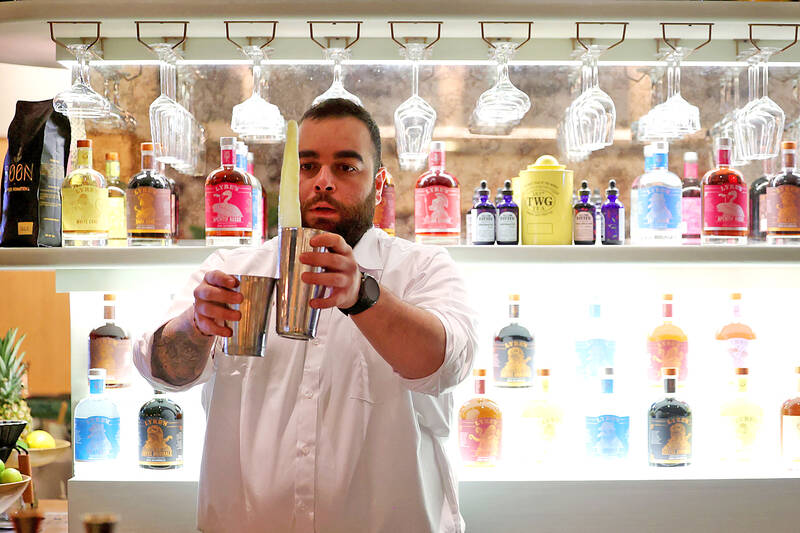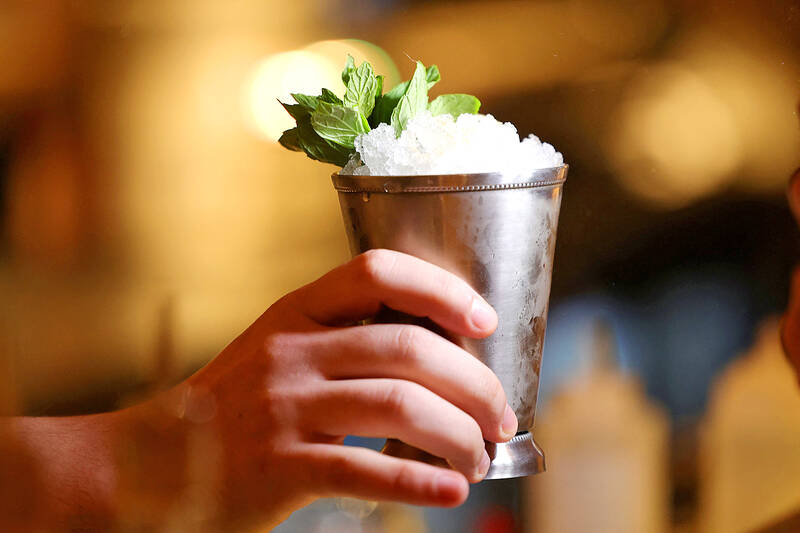The news that Saudi Arabia is to allow its first alcohol shop has citizens and foreigners alike mulling one question: Is this a minor policy tweak, or a major upheaval?
Sources familiar with preparations for the store disclosed details of the plan on Wednesday, as a document circulated indicating just how carefully leaders of the teetotalling Gulf kingdom is to manage its operations.
Located in the capital’s Diplomatic Quarter district, the store is to be accessible only to non-Muslim diplomats, meaning that for the vast majority of Saudi Arabia’s 32 million people, nothing has changed for the moment.

Photo: AFP
Additionally, purchasing quotas are to be enforced. Access to the store is to be restricted to those who register via an application. Customers are to be asked to keep their phones in a “special mobile pouch” while they browse for beer, wine and spirits.
Still, some Riyadh residents said that they saw the development as the first step toward wider availability of alcohol, which would be a dramatic break from the nationwide prohibition that has been in place since 1952.
“This country keeps on surprising us,” said a Lebanese businessman dining on Wednesday night at LPM, a French restaurant in Riyadh known for its lengthy list of non-alcoholic wine and cocktails mixed behind an 18m long marble-top bar. “It is a country that is developing, that is growing and that is attracting a lot of talent and a lot of investments. So yes, of course, there’s going to be much more.”

Photo: AFP
However, like other diners at LPM, the businessman declined to be named, highlighting the sensitivity surrounding anything related to alcohol — which is banned in Islam — in the country that is home to the Muslim holy places of Mecca and Medina. At another table, tucking into an order of hazelnut tiramisu, two Saudi men in their thirties said they worried about what the sale of alcohol would mean for the kingdom’s identity.
“It’s not who we are,” one of the men said. “It’s not that I have, like, some kind of judgement towards people who drink. No, absolutely not. But having something that is out there affects the culture and the community.”
He added: “Let’s say if I have a younger sibling, if alcohol is out there, there is a possibility that he will become an alcoholic.”
His friend chimed in to say that he would prefer that people continue to go abroad to drink, as many do currently.
“It’s just scary that they’re allowing such things into [the country]. Any individual that wants to try alcohol, it’s literally an hour by plane away,” he said. “Everybody travels here. It’s easily accessible. But what I want to say is that in this jurisdiction, I’m not happy that it’s allowed.”
Under his Vision 2030 reform agenda, de facto ruler, Saudi Arabian Crown Prince Mohammad bin Salman, is trying to turn the world’s biggest crude exporter into a business, sports and tourism hub that can prosper in an eventual post-oil era. That requires attracting more foreigners and permitting alcohol “in stages” could play a role in that, Arab Gulf States Institute in Washington researcher Kristin Diwan said. “This is one more step in normalizing government sanction of alcohol in defined settings.”
The Saudi Arabian Center for International Communication on Wednesday said the new policy’s goal was “to counter the illicit trade of alcohol goods and products received by diplomatic missions.”
That was an apparent reference to the thriving local black market, where bottles of whiskey frequently go for hundreds of dollars. Framing the news this way “is likely intended to send a subtle message that change may be on the way, but that the process will be incremental and tightly controlled,” said Kristian Ulrichsen, fellow for the Middle East at Rice University’s Baker Institute for Public Policy.
For their part, restaurant industry insiders were unsure whether business would be affected in the immediate term.
“For the food and beverage industry, this doesn’t make a direct impact,” one manager said, though he added that if it alters how the outside world sees Saudi Arabia, “this could attract footfall towards the kingdom,” meaning more customers.
If access to alcohol in Saudi Arabia eventually expands beyond what sources described on Wednesday, those with the most to lose include vendors of mocktails and other non-alcoholic beverages, which are increasingly fashionable.
“It’s not a good thing for me. I’ll lose my business,” Evans Kahindi, brand manager for Blended by Lyre’s, a non-alcoholic spirits company, said with a laugh. “There has always been speculation about having the real alcohol here... But to be honest, it’s with the government, we don’t know yet and I cannot speculate on anything.”

The US dollar was trading at NT$29.7 at 10am today on the Taipei Foreign Exchange, as the New Taiwan dollar gained NT$1.364 from the previous close last week. The NT dollar continued to rise today, after surging 3.07 percent on Friday. After opening at NT$30.91, the NT dollar gained more than NT$1 in just 15 minutes, briefly passing the NT$30 mark. Before the US Department of the Treasury's semi-annual currency report came out, expectations that the NT dollar would keep rising were already building. The NT dollar on Friday closed at NT$31.064, up by NT$0.953 — a 3.07 percent single-day gain. Today,

‘SHORT TERM’: The local currency would likely remain strong in the near term, driven by anticipated US trade pressure, capital inflows and expectations of a US Fed rate cut The US dollar is expected to fall below NT$30 in the near term, as traders anticipate increased pressure from Washington for Taiwan to allow the New Taiwan dollar to appreciate, Cathay United Bank (國泰世華銀行) chief economist Lin Chi-chao (林啟超) said. Following a sharp drop in the greenback against the NT dollar on Friday, Lin told the Central News Agency that the local currency is likely to remain strong in the short term, driven in part by market psychology surrounding anticipated US policy pressure. On Friday, the US dollar fell NT$0.953, or 3.07 percent, closing at NT$31.064 — its lowest level since Jan.

The New Taiwan dollar and Taiwanese stocks surged on signs that trade tensions between the world’s top two economies might start easing and as US tech earnings boosted the outlook of the nation’s semiconductor exports. The NT dollar strengthened as much as 3.8 percent versus the US dollar to 30.815, the biggest intraday gain since January 2011, closing at NT$31.064. The benchmark TAIEX jumped 2.73 percent to outperform the region’s equity gauges. Outlook for global trade improved after China said it is assessing possible trade talks with the US, providing a boost for the nation’s currency and shares. As the NT dollar

The Financial Supervisory Commission (FSC) yesterday met with some of the nation’s largest insurance companies as a skyrocketing New Taiwan dollar piles pressure on their hundreds of billions of dollars in US bond investments. The commission has asked some life insurance firms, among the biggest Asian holders of US debt, to discuss how the rapidly strengthening NT dollar has impacted their operations, people familiar with the matter said. The meeting took place as the NT dollar jumped as much as 5 percent yesterday, its biggest intraday gain in more than three decades. The local currency surged as exporters rushed to